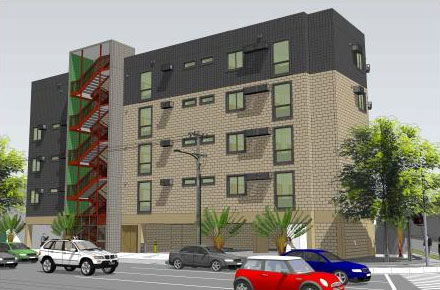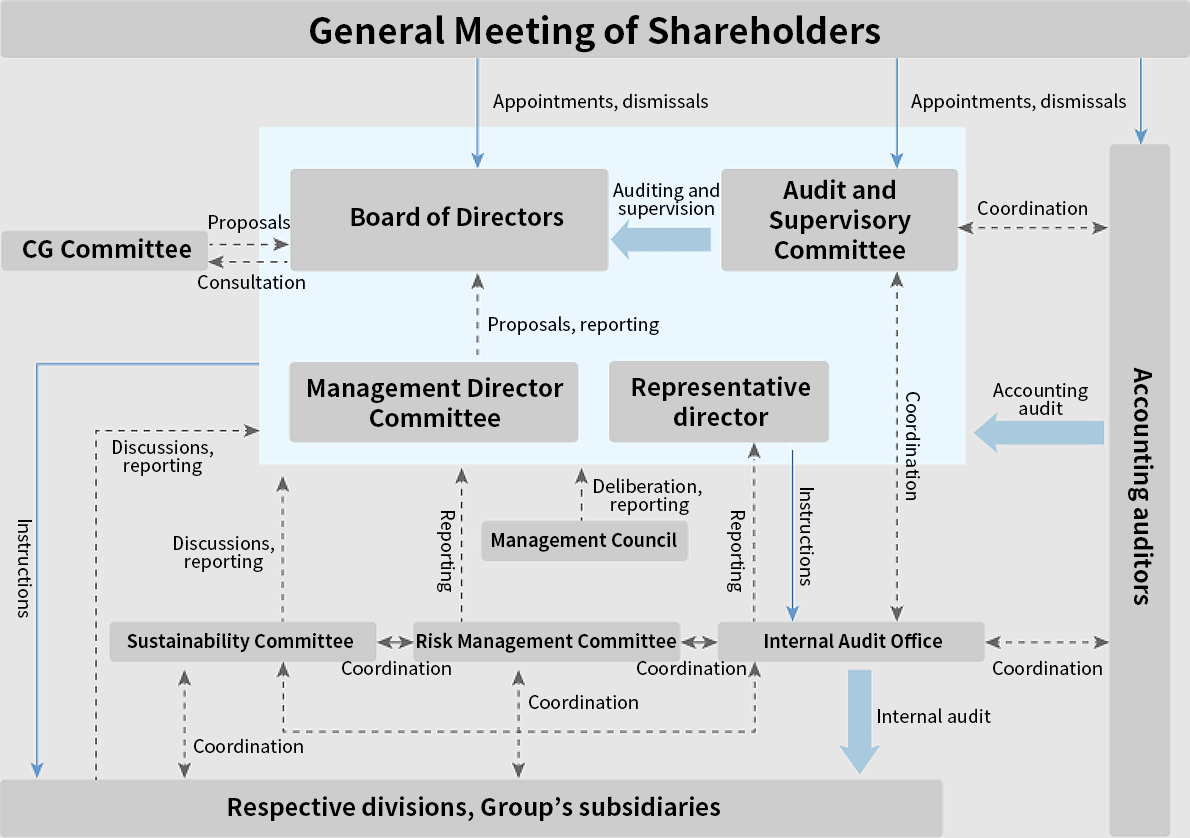ADWG Group's ESG initiatives
Environment
Initiatives with eco-friendly products
By accurately identifying the needs of the local community and customers, enhancing the value of real estate and continuing to transform them into high-value-added properties, we are protecting the environment and society with our revitalization of real estate.
The ADWG Group introduces eco-friendly products when revitalizing real estate and is thus taking various sustainable initiatives that consider the environment, such as reuse and recycling, protecting water quality and conserving water.

Reducing environment load by recycling waste materials

Use of eco-friendly materials
Adoption of green purchasing law-compliant products
** Reductions to thermal load
Environmental certification: Four-star rating under the Building-Housing Energy-efficiency Labeling System (BELS) (*August 2021)
Green loan procurement through crowd funding
Social
Social initiatives
In light of the local law (known as Bill 7*) formulated in 2019, which is intended to allow rental housing to be provided at affordable prices to address the steep rise in housing prices in Hawaii, we are developing rental housing for local residents in Hawaii.
This law gives incentives to developers such as easing construction criteria and providing exemptions for fees paid to government and makes it easier for the private sector to participate.

Path to rental housing in Hawaii (under development)
This contributes to SDG Target 11.1, which is "by 2030, ensure access for all to adequate, safe and affordable housing and basic services and upgrade slums," and is therefore a Group business activity that has great social significance.
Governance
Disclosure materials related to corporate governance
The Group's Board of Directors has established a corporate governance code with the following principles and initiatives as the Company's Guidelines. We also publish a Corporate Governance Report in line with these guidelines.
April 1, 2024: コーポレート・ガバナンス報告書
April 1, 2024: コーポレートガバナンス・コードに対する当社ガイドライン(方針及び取組み)
Basic Approach to Corporate Governance
A.D.Works Group's (ADWG) corporate philosophy is described below.
The ADWG Group contributes to the active development of people and society by creating and providing original value while flexibly changing.
Just as we have laid out in our corporate philosophy, which is "the ADWG Group contributes to the active development of people and society by creating and providing original value while flexibly changing," the Group resolves social issues through its business and takes initiatives so that it can raise economic value and social value at the same time, while adapting flexibly to market trends and the trends of the times.
There are two aspects to the social significance of the Group's business.
The first is to maximize our ability to discern the potential of real estate, which is a form of social capital, and our ability to plan products, and not only respond to the expectations of real estate users, but also contribute to the development of the region and community. The second is to provide suitable solutions to meet customer investment or asset management needs, and in addition to responding to these expectations, encourage the capital cycle and contribute to the dynamism of economic and social activity.
Moreover, going forward, we aim to combine diverse operational methods in our entry and exit strategies for the commercialization of income properties with a wide range of products that are not limited to real estate, while also expanding our target customers. This will enhance the depth of the Group's business and enable us to evolve into an investment solutions company.
Through these means, the Group will actively expand business and promote SDG management that contributes to broader ESG investment in order to achieve ever-broadening social significance.
We understand that the Company's current corporate governance system differs in some ways from what the corporate governance code (CG Code) had assumed, and we recognize at the same time that the response to the governance system and CG Code will also need to change as the Company's environment and conditions change going forward.
The Group intends to build an appropriate governance system in line with stages, including the approach to the Board of Directors, to match the Group's growth process and management environment.
Overview of corporate governance system and reasons this system was adopted
The Company has an Audit and Supervisory Committee, and has established a Board of Directors, Audit and Supervisory Committee and accounting auditors.
The Board of Directors consists of 6 directors (excluding directors who are Audit and Supervisory Committee Members) and 3 directors who are Audit and Supervisory Committee members (all outside directors), for a total of 9 directors. The Board of Directors meets once a month, and in addition, when decisions need to be made urgently, an emergency Board of Directors meeting is held as necessary in order to carry out operations more rapidly and enhance the transparency of management.
The reasons for adopting this system are as follows.
The approach taken by the Board of Directors can be divided into the following three types, in line with the roles that are prioritized.
Decision-making on operations and mutual supervision
Board of Directors that prioritizes the role of decision-making related to the execution of operations
Emphasis on monitoring
This Board of Directors emphasizes the role of monitoring, and the authority over daily decision-making on the execution of operations is generally left up to decision-making bodies such as lower-level management committees rather than the Board of Directors.
Operations decision-making and mutual supervision, including Directors whose main responsibility is supervision
This is a hybrid type of Board of Directors that balances the role of decisions on operations by executive directors and the supervisory functions of outside directors, whose main responsibility is supervisory work.
The approach to the Board of Directors anticipated in the principles of the CG Code is closer to the type that emphasizes monitoring, and the Company views the methods (code) aimed at satisfying the intention behind each principle as one example of best practice for Board of Directors that emphasizes monitoring.
We have determined that the best approach to use at this point with the Board of Directors is "operation decision-making and mutual supervision, including Directors whose main responsibility is supervision," for the reasons outlined below. These aspects are considered in terms of three points: (1) conditions that provide incentives encouraging sound risk-taking, (2) capital makeup and (3) sense of scale. These will serve as the premises when pursuing initiatives in line with the Company's CG code going forward.
Based on the above three points, in the Company's current management scale and growth stage, we determined the optimal solution to be a Board of Directors, made up of a relatively small number of directors who are well-versed in the Company's business, and a Management Director Committee, which is delegated by the Board of Directors (a decision-making body comprising executive directors who meet certain standards set by the Company), make decisions regarding the execution of operations and flexible management decisions, fulfilling the responsibility to achieve sustainable growth and improve corporate value. We adopted the Company with an Audit and Supervisory Committee structure to more effectively implement the type of Board of Directors characterized by "operation decision-making and mutual supervision, including Directors whose main responsibility is supervision."
Other items related to corporate governance
<Management Director Committee>
The Management Director Committee, which is made up of management directors (the representative director, director in charge of management and planning, and directors chosen as management directors by the Board of Directors), meets once or more per month on a voluntary basis with the objective of making the necessary decisions on the execution of operations, based on the Group's basic policies on management, its Medium-term Management Plan, etc., and to facilitate corporate management.
<CG Committee>
The CG Committee comprises independent outside directors, the President and CEO, the CFO and others, and the chair is selected from among the independent outside directors. The majority of members are independent outside directors. It was established with the aim of discussing matters related to the selection of candidates for director positions, the appointment and dismissal of directors, compensation for directors, and successor plans for the President and CEO, in consultation with the Board of Directors, and makes proposals to the Board of Directors after a decision is made. The committee meets as necessary.
<ADWG Group's Management Council>
As a reporting organization, the Council discusses the Group's basic policies on management as well as important matters related to management and the execution and management of operations. The Council is made up of members designated by the Company's management directors and meets once a month.
<Risk Management Committee>
The Company has set up a Risk Management Committee, which is chaired by the director in charge of risk management and consists of the Company's management directors and department heads. The Committee confirms risk and considers response measures.
<Sustainability Committee>
The Group aims to raise corporate value sustainably and contribute to the sustainable development of society by generating social and economic value through business activities. With this objective, the Group has set up a Sustainability Committee chaired by the representative director and CEO and comprising the officers in charge of sustainability, the Company's directors and managing officers, and Group directors and employees designated by the chair. The Committee confirms the Group's pursuit of sustainability activities and the progress made, as well as additional functions.
<Other>
Subsidiaries are monitored on matters related to risk and compliance and the efficiency of operations, based on regulations for affiliated companies, and the status of the execution of operations is monitored, while respecting the independence of the subsidiary company.
The diagram of the Company's corporate governance system is as follows.

